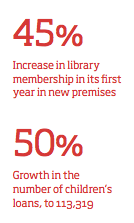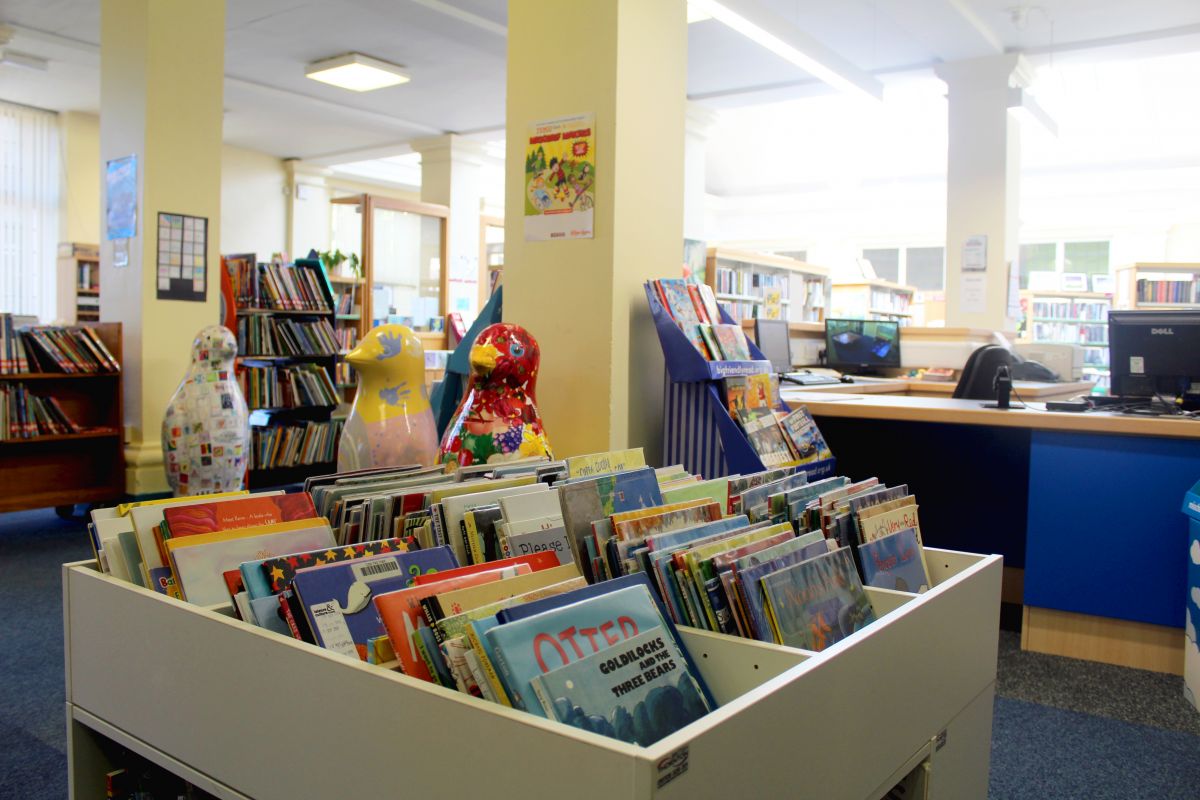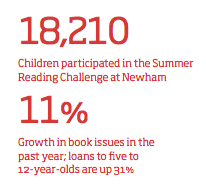You are viewing your 1 free article this month. Login to read more articles.
Library of the Year: shortlist spotlight
Winner: Liverpool Central Library
Liverpool
A busy events programme and a host of energetic initiatives have made Liverpool Central Library a real focus for the community, with local residents attesting to the fact that the building—open seven days a week—is "always packed".
 Since re-opening in 2013 after major refurbishment, the library has seen a "solid, steady" increase in footfall, with 750,000 visitors flooding through its doors last year, and daily visits rising to 3,000 a day during schools’ half-term breaks.
Since re-opening in 2013 after major refurbishment, the library has seen a "solid, steady" increase in footfall, with 750,000 visitors flooding through its doors last year, and daily visits rising to 3,000 a day during schools’ half-term breaks.
Some of those visits are from those eager to see the reimagined building itself—the light-filled refurbishment saw Liverpool Central Library named one of the of the world’s most beautiful libraries by BBC Culture—but the team also works hard to draw Liverpool residents in by "doing things a bit differently" and ensuring there is "lots going on for children and families", according to head of libraries John Keane.
Events include MakeFest, where visitors create art and digital technologies, and Light Night, which sees the library open until midnight. Increasingly the library is working with Waterstones on high-profile author visits, as well as with publishers of local titles, such as De Coubertin Books. There are exhibition spaces throughout the year, with a collection of art celebrating the 200th anniversary of the creation of Mary Shelleys titular monster Frankenstein currently occupying the first floor.
The library has also run themed programmes alongside the major events in the region, working with Liverpool literary festival WOWFest, arts and social justice organisation Homotopia, and many other local cultural organisations. It also works with entrepreneurs and businesses via its Business and IP Centre. Sector insiders say they have noticed a much more outward-looking, partnership-friendly approach from the library in recent times.
 For the future, the library says it is working on creating a "bigger, bolder" advance programme of events and exhibitions, and it is also in talks with a local radio station about starting a monthly city-wide book club.
For the future, the library says it is working on creating a "bigger, bolder" advance programme of events and exhibitions, and it is also in talks with a local radio station about starting a monthly city-wide book club.
"We are looking to really increase footfall and engage with even more people than we do,” said Keane. “We will then hopefully convert the interest in the library and the new audiences into more members and more books borrowed."
Those figures are a work in progress, with loans currently "holding steady" at something over 250,000 a year, Keane said.
Liverpool Central Library has a good ratio of professional staffing, with 20 out of 40 workers professionally qualified librarians. The library uses supplier selection for fiction stock, with Askews handling its adult purchasing and Peters its children’s buying. The library says that it seriously values suggestions from its customers and from local book groups, as well as feedback from booksellers: Liverpool sells the highest number of crime books outside London, so the library has upped its crime fiction offer accordingly.
"Many of our borrowers have been using the library for years and there is a great deal of anticipation of new titles from the most popular authors—especially series characters by authors such as Lee Child and Michael Connolly," noted Keane.
As the council’s flagship library, the considerable resources devoted to Liverpool Central Library’s refurbishment were not uncontroversial; in past years, there have been cutbacks elsewhere, with five of the city’s other 18 libraries now community managed. However, Keane is adamant that the service has not suffered.
"The council invests in the whole library service, and Central Library is the flagship only because of location," he said, adding: "The other libraries are doing well and holding their own."
Shortlisted: Storyhouse
Chester, Cheshire
The first of two Cheshire libraries on the shortlist is the spectacular Storyhouse, created on an equally spectacular budget. The combined library, theatre and cinema in Chester—recently formally opened by the Queen—cost £37m and first opened its doors to residents 12 months ago. Since then, it has racked up a million visitors.
Created in an art-deco former Odeon building, the imaginative design sees the library, which transferred from neighbouring premises, wrapped around the other facilities, with a children’s library and story den on the ground floor, a quiet reading room on the upper floor, non-fiction bookshelves lining the café walls, and a separate area for people studying and working. All staff can issue books, and loans can be made up to 11.30 p.m. Fifteen dedicated library employees, called the "engagement team", are backed by qualified librarians on the premises one or two days a week to manage the book stock and help deliver the service.

Rachel Foster, senior manager for libraries at Cheshire West, said the development came after Chester’s One City plan identified culture as a driver for regeneration. The library service was "a key part" of planning the design of Storyhouse from the start. Although usage is still being mapped, anecdotally the library  has seen a demographic shift, with the "phenomenal" children’s library attracting families, and teenagers and young adults seeing Storyhouse as a welcoming place to meet. However the "very local customer base" from the former premises have stayed, taking advantage of regular Knit and Natter sessions and its close links with Age UK. The library has seen a 45% jump in membership and a 50% leap in children’s book issues in its first year.
has seen a demographic shift, with the "phenomenal" children’s library attracting families, and teenagers and young adults seeing Storyhouse as a welcoming place to meet. However the "very local customer base" from the former premises have stayed, taking advantage of regular Knit and Natter sessions and its close links with Age UK. The library has seen a 45% jump in membership and a 50% leap in children’s book issues in its first year.
Expensive flagship projects can suck up funds which would otherwise be spread around the system. But Storyhouse has had funding from Arts Council England, and Foster said there have been no related cuts in opening hours or service in Chester’s branch libraries. "It was important to us that we didn’t invest in Storyhouse at the expense of other libraries," she said. "In fact it has raised the profile of libraries as a whole. We’ve had people coming in [to the branch libraries] saying: ‘Storyhouse has reminded me why I love libraries.’"
Shortlisted: Macclesfield Library
Macclesfield, Cheshire
In 2005, a think-tank deemed Cheshire’s Macclesfield the least cultured place in Britain, an image Macclesfield library, alongside other local institutions, has been determined to overturn.
 The approach seems to be working. In recently published Chartered Institute of Public Finance & Accountancy (CIPFA) statistics, Macclesfield Library had the highest issues of any north-west library (311,406) for the second year running, and last year the library had more than 220,000 visitors.
The approach seems to be working. In recently published Chartered Institute of Public Finance & Accountancy (CIPFA) statistics, Macclesfield Library had the highest issues of any north-west library (311,406) for the second year running, and last year the library had more than 220,000 visitors.
Library manager Julie Bullock emphasised that "stock is paramount" when working to increase library usage. "The staff work hard to promote the stock, with displays and discussions, and also by trying to get a lot of different customers in," she said. The library promotes its stock on social media, with reader reviews and staff recommendations. It also gives and receives feedback and sends questions to authors and publishers, as well as tying-in appropriate lending stock to every event it holds.
Macclesfield Library also has three adult reading groups, which are based in the library and run by staff, one of which is for visitors, who are referred by social workers, to promote mental well-being.

The library recently held a Susan Hill Spooky Storytime for adults, which turned into an oral storytelling event when attendees shared their own ghost stories. And for children, the library has regular events and displays, and last year more than 1,000 children participated in its Summer Reading Challenge.
Last year, the library worked with Cheshire Rural Touring Arts to bring high-quality theatre performances via its Live in Libraries programme, with three sold-out performances. A recent refurbishment provided a new IT suite and local studies area, which enables the library to hold digital inclusion events, a weekly jobs club, and to work in partnership with local groups to provide heritage and culture displays and events.The library also received funding from the Arts Council, UK online centres and Macclesfield Parish Council to help increase events and opportunities.
Shortlisted: HMP Thameside
London
The library at Greenwich-situated men’s prison HMP Thameside was shortlisted for its success in creating what prison residents have described as a "calm oasis during a challenging and difficult time", thanks to the vision of librarian Neil Barclay.
With up to 1,200 residents at any time, the library operates within a span of approximately 1,000 sq ft, with a stock of just over 6,000 titles and 1,200 DVDs. In the last calendar year it had nearly 25,000 individual library visits. An important way of keeping prisoners engaged with the library is its request-driven method of book selection, Barclay said. As 30% of residents are foreign nationals, the library carries stock in 20 different languages. The library also scans newspapers for book reviews, and takes recommendations from prison reading groups and also from its primary new book supplier, Waterstones.

Barclay joined the library in July 2013, and in 2015 he was given the Butler Trust Award, nominated by prisoners, for the "outstanding dedication, skill and creativity he has shown in transforming the prison’s library into a dynamic learning and resource centre, much valued by prisoners and staff, and described as ‘the envy of other prisons’." Barclay said: "When the library opened, resources and stock were very low and people didn’t want to come. But we’ve worked hard to put the library on the map. It was hard to begin with but enjoyable. It is really rewarding to see prisoners engaging with libraries."
The library has had many high- profile visitors including Sir Ian McKellen, Lenny Henry, Paula Hawkins, Val McDermid, Martina Cole and, most recently, Adam Kay, who discussed his book This is Going to Hurt (Picador).
Barclay says that humorous books are essential for prisoners, to take them away from their situation. Each attendee to the book club gets a signed copy of the book. "Ownership is important to rehabilitation," said Barclay. "It’s very easy to take access to books for granted. In prison it’s a form of escapism."
Shortlisted: HMP Ford
Ford, West Sussex
The library at resettlement men’s prison HMP Ford in West Sussex stands out for success in boosting its popularity with users, and facilitating relationship-building between prisoners and the local community.
In the two years since prison librarian Linda Collins joined, visits have doubled to 1,000 a month. To achieve this, Collins expanded the library’s opening hours and brought stock buying under the control of the librarians. She also increased the range of magazines and newspapers stocked. "My line-manager gleefully reports that visits to the library consistently outrun those to healthcare," she said. Collins also worked to change the environment of the library to make it "much more welcoming", and started a reading group and literacy classes. The prisoners have been at the heart of the revamp, with one helping to design and paint a book wall display, and another inscribing "the journey of a lifetime starts with the turning of a page" above the library counter.
A big aim of the library is to enhance links to the local community. Recently, with the support of the governor, Collins organised a joint reading group session in the prison between the prisoners and a local community reading group. "This went very well and the visitors were very surprised to see what a prison library was like and what great condition it was in," said Collins. "The prisoners really appreciated them coming in." The library also hosts monthly events, which regularly draw an enthusiastic audience, including author talks, local history presentations, Shakespeare Hip-Hop and poetry workshops.
The role of a prison librarian has "unique challenges but also immense rewards", said Collins. While the librarians have to deal with the social and emotional wellbeing of prisoners, they are "never backwards in coming forward with their opinions", and the response from the prisoners makes the challenges worth it. "There are incredible highs along with the lows," said Collins. "We’re very much appreciated here."
Shortlisted: Colliers Wood Library
London
 Its dementia-friendly library design and staff training made the new Colliers Wood Library in Merton, south-west London, stand out.
Its dementia-friendly library design and staff training made the new Colliers Wood Library in Merton, south-west London, stand out.
The library reopened in February, following a deal between the council and developer Rocco Homes which saw the latter invest £2m in the project.
As the library is used by an increasing number of older people, community consultation found that having a service and facilities that were sympathetic to this demographic would enhance what the library offers. So working with the Alzheimer’s Society, the new library was carefully designed to consider the use of colours
and furnishing, while staff and volunteers have been trained as "Dementia Friends".

Since re-opening, the library has seen a 312% increase in visitor numbers in comparison to when the old library was last open, back in 2015. Over the same period, usage of the library has gone up, with a 64% increase in borrowing.
Anthony Hopkins, head of Merton library service, said the increase was down to staff working with the community on the stock selection, and enticing new users to the library. However, the increased number of visitors has brought with it new challenges. Hopkins said: "We now have a coffee shop, which is really great, but the demand on facilities is the biggest challenge."
Shortlisted: Lochee Library
Dundee
Lochee Library, which opened in 1896 and was the first library in Dundee, is still at the heart of the community 122 years later. Its librarian Joan Rodger has worked there for the past 45 years, and is such a key part of the community that she’s regularly asked to switch on the Christmas Lights, present school prizes and open new buildings.
 Rodger is very proud of the "highly interactive" story sessions that the library hosts. One recent session involved fruit and veg brought in by staff, with children encouraged to try something they had never eaten. Rodger often adds a Scottish twist to old favourites, such as "heids, shudders, knees and taes", too.
Rodger is very proud of the "highly interactive" story sessions that the library hosts. One recent session involved fruit and veg brought in by staff, with children encouraged to try something they had never eaten. Rodger often adds a Scottish twist to old favourites, such as "heids, shudders, knees and taes", too.
She says that visitors to the library are increasingly more interested in using computers and the library’s free wi-fi, but adds that the most important thing is getting people, and especially youngsters, through the doors and using the library.
In the past year, more than 740 events were held, including storytimes, craft sessions and reading groups, an increase of over 150 year on year.

A highlight was a "Crime and Cake" event with local authors Wendy Jones and Chris Longmuir. The library also hosts a relaxation group, encouraging participants to share stories while knitting or crafting, and, working with the swimming pool that’s located next door, the library held swimming parties for 160 people, with visitors enjoying a story session after a swim.
Lochee is an area of "significant deprivation" and library staff are heavily involved in supporting local causes. A recent tombola raised £600 for a "buddy bench" for lonely or sad pupils at a nearby school. The service also hosts regular visits from Macmillan cancer nurses, who sit and chat with visitors to the library.
Shortlisted: Newham Libraries
London
While Newham describes adult usage of its libraries as "stable", it was its focused work on increasing engagement with schoolchildren through projects which encourage four to 12-year-olds to read for pleasure that won it a shortlisting.
 Newham is classed as the 25th most deprived borough in England (out of 326), with high child poverty levels. The library service decided to make use of the Summer Reading Challenge as a way to get the borough’s children more involved with the library, as it "offers a unique opportunity to engage with parents and schools in an established national brand that has a simple and familiar framework", said library manager Caroline Rae.
Newham is classed as the 25th most deprived borough in England (out of 326), with high child poverty levels. The library service decided to make use of the Summer Reading Challenge as a way to get the borough’s children more involved with the library, as it "offers a unique opportunity to engage with parents and schools in an established national brand that has a simple and familiar framework", said library manager Caroline Rae.
Twenty-three of the borough’s schools agreed to take part in last year’s challenge. Events were centrally organised and each of Newham’s 10 libraries hosted an author visit, a forensic-science detective workshop, a musical storytelling workshop, a theatre performance, an interactive comedy performance and a poetry writing workshop. Following the completion of the challenge, the relationship with local schools has blossomed, helping to develop and launch a new, well-received school visiting programme. "Schools that were previously difficult to engage with have become regular visitors," said Rae.
She added that advocacy was the main outcome, and a more important barometer of success than the number of kids who finished the Summer Reading Challenge. "For a relatively small cost the library reached out to 18,000 children and their families, increased awareness of the library and of reading for pleasure," Rae said.
Shortlisted: Royal College of Nursing Library & Archive Service
London
The Royal College of Nursing Library & Archive Service was shortlisted for its transition from a traditional members-only library to a responsive service open to the public as well as to nurses.
The library, which will mark its centenary in 2022, began welcoming the public in 2013, and at the same time launched an exhibitions and events programme which last year attracted over 12,000 visitors. Its figures across the board are impressive too: last year borrowing was up 7%, with web hits up 10% and footfall soaring 17%.

The library has also recently moved to patron-driven acquisition as its main means of book purchasing, meaning that the library purchases stock according to user demand. The RCN now provides members with access to more than 30,000 e-books, and it has introduced subject guides and also tweets about new stock. With a membership of 435,000 spread over the country, library and archive service joint manager Anna Semmens explained that a solely print offering was not conducive to higher borrowing figures.
The transformation the library has undergone in recent times has been "very positive", said Semmens. "We used to have a really convoluted system, and the library wasn’t that accessible. But now it’s been refurbished, it’s a welcoming space for our membership and the public."
Shortlisted: East Lothian Council Library Service
Scotland
A packed events programme and support for its school librarians gained East Lothian Council Library Service its shortlisting.
The small council has 12 public libraries and six secondary schools, with the school librarians recently integrating with the public library service. East Lothian is now one of the very few councils in Scotland with a full-time qualified librarian in every secondary school, and the school librarians get professional support and leadership from the Schools & Young People’s Service at the council,specifically from senior librarian Agnes Guyon.
The library service also has an impressive events programme, making use of support from Creative Scotland and the Scottish Book Trust to hold more than 30 author events last year, including with Judy Murray, cyclist Mark Beaumont, broadcaster Sally Magnusson and Katie Morag creator Mhairi Hedderwick.
An extensive programme for Book Week Scotland, a young people’s book festival to celebrate the 700th anniversary of a charter granted to the town of Haddington by Robert the Bruce, and a series of adventure talks featuring the likes of writer Benedict Allen and filmmaker Gordon Buchanan are upcoming in 2018.
"Author visits are something we’ve been really keen on," said area librarian Trina Gavin. "While it’s great to see authors at the Edinburgh Book Festival, that’s not affordable foreveryone. We want to present events that are accessible to everyone."
The library service also has its own book award, the Lennox Award, for titles aimed at those aged five to seven. The nominated authors attend an awards ceremony, while classes of schoolchildren give presentations to champion their favourite short- listed book.










